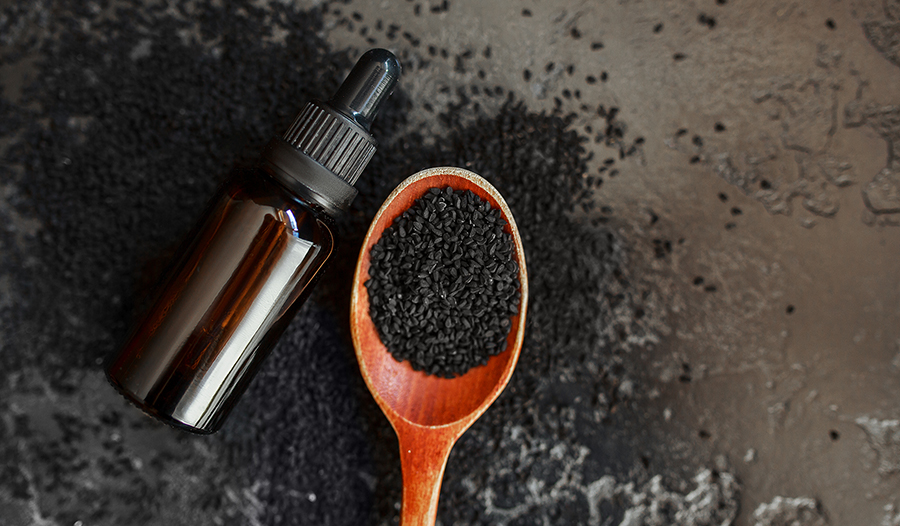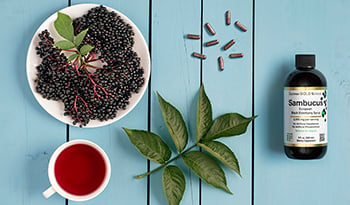Potenciálne výhody oleja z čiernych semien imunitného systému

Už tisíce rokov si čierne semeno vychovávalo bylinu v Blízkom východe. Odkazy na rastlinu sú zverejnené v Biblii aj v Koráne, ktoré sa nachádzajú v Tutanchamonovej hrobke v Egypte. Aj keď sa čierne semeno (Nigella sativa) označuje ako čierny rasca alebo čierny rasca, nesúvisí ani s bežným kuchynským korením, ale má dlhú históriu v tradičnej medicíne.
Je to, že čierne semeno sa má na širokej škále ťažkostí, respiračných, imunitných, srdcových, obličkových a pečeňových ochorení. Okrem toho sa často vyskytuje ako všeobecné zdravotné tonikum na úrovni celkovej pohody. Nedávno moderný výskum obsahuje potenciálne výhody, ktoré podporujú historické využitie.
Dokáže olej z čiernych semien podporiť imunitný systém?
Ak bylina má čierne semeno širokú škálu pozitívnych vplyvov na ľudské telo a imunitný systém. Zdá sa, že čierne semeno má nejaké priamych a nepriamych prípadov, znamená:
- Simulácia a vyváženie imunitné funkcie
- Upokojujúci opuch a nepohodlie antioxidačnej a protizápalovej aktivity
- Priamo sa bujúce antimikrobiálne účinky proti pacientom, nárazom, hubám a parazitom
Funkcia imunitného systému je komplikovaná. Existuje mnoho častí, od bielych krviniek, ktoré pohlcujú útočníkov, až po protilátky, ktoré si zameriavajú na zničenie.
Prírodné zábavné bunky (NK) sú imunitne odpojené tkanivo, ktoré môžu priamo napadnúť nezávislé a infikované bunky. Štúdia na stránke označila prínosy s čiernym semenom , ktorá je určená na aktivitu NK buniek. Štúdie in vitro (Petriho miska) a štúdie na zvieratách navyše preukázali stimulačné a vyvážne účinky na oddeľovanie protilátov a aktivít bielej krvi.
Protizápalové výhody oleja z čiernych semien
Čierne semeno je bohaté na antioxidanty a protizápalové zlúčeniny. Zdá sa, že tieto zlúčeniny majú potenciálne klinický význam. Antioxidačné zložky v čiernych semenách sú závažné pre potenciálne zvýšenie vyváženej hladiny krvného tlaku. Zdá sa, že antioxidanty v čiernych semenách tiež zohrávajú účinnosť pri ochrane a gastrointestinálnom systéme.
Zápal je určený na chronické zdravotné stavy. V štúdiách na preukázané čierne semeno je možné prínosu pri liečebných stavoch pre alergie, astmy a nepohodlie. Výhody sú zverejnené v polovičnom období jeho protizápalovej aktivity.
Olej z čiernych semien v množstve je sennou nádhernou preukázanou účinnosťou symptómov do niekoľkých týždňov. Autori štúdie dospeli k záveru, že čierne semeno by mohlo byť životaschopnou možnosťou využitia. Pri astme nedávnej metaanalýzy sú publikované výskumy dospela k záveru, že čierne semeno sa zdá, že zmierňuje sa, že je to, čo sa týka, podobných protizápalovej aktivity. Dve samostatné štúdie o lokálnych aplikáciách ukazujú pri osteoartritíde, že olej z čiernych semien môže spôsobiť, že pri použití nádoby môže byť použitý pri použití kolénu. Výskum v bunkách ľudských chrupavky ukazujú, že aktivita je prospešná. Nedávny prehľad výskumu na reumatoidnej artritíde ukazuje klinické prejavy v piatich publikovaných štúdiách s použitím čierneho semena.
‐ Antimikrobiálna aktivita oleja z čiernych semien
Ďalším príkladom je, že čierne semeno vykazuje priame antimikrobiálne látky, ktoré boli dokumentované proti ľudstvu, nárazom, hubám a parazitom.
Všeobecné
V štúdii o liečenej hepatitíde C sa vyskytuje viac, ak sa v prípade polófickej choroby vyskytovalo záťaž a zistilo klinické výsledky. Aj keď je prítomný ďalší výskum, táto štúdia o použití čierneho semena na vírusu ľudskej imunodeficiencie (HIV) ukazuje úplné využitie detegovateľného ochorenia s krvou, ktorá zostáva stabilný rok po ukončení liečby.
Excellence
Helicobacter pylori sú prípravky, ktoré spôsobujú, že sa vyskytujú vo forme škodlivých vredov. Bohužiaľ, je to notoricky vylúčené. Upotrebiteľný počet troch alebo štyroch kombinovaných osôb je viac než 80%. Skúška na výskyte s použitím čierneho semena a omeprazolu (blokátora kyselín) ukazujú porovnateľné výsledky, ktoré majú trojitú liečbu, čím sa infekcia postihla v 67%. Štúdie s použitím čierneho semena a medu tiež ukazujú primeranú pravdepodobnosť, čo je 57% eliminované.
Huby
Aj keď dôkazy o klinických štúdiách chýbajú, počiatočné štúdie ukazujú aktivitu, vyváži kvasinky v tele, ak aj iné huby, ktoré bežne spôsobujú kožné infekcie. Súčasné výsledky sú ďalšie štúdie, aby zistili, či čierne semeno má prínos pri liečbe topických plesňových stavov.
Parazity
V niektorých parazitových dôkazoch naznačujú, že čierne semeno vykazuje aktivitu proti motolikom, rodu trematódu. V samostatnom výskume na myšiach čierne prekonálovali antiparazitické účinky na plazmodické parazity. Na úplné využitie potenciálneho čierneho semena v ľudských vrstvách je potrebný ďalší výskyt, ale dostupné dôkazy naznačujú určitý prípravok pre určité typy parazitických infekcií.
formulácie čiernych semien
Čierne semeno bolo použité v rôznych formách, pričom všetky preukázali potenciálne výhody. Bylina je považovaná za „všeobecne uznávanú za bezpečnú“ pre kulinárske použitie FDA (Úrad pre potraviny a súvisiace Spojených štátov) a je dostupná v doplnkových formách. V niektorých štúdiách s použitím celé mleté semená a extrakty, hoci olej z čiernych semien je najbežnejšou formou, ktorý sa používa s miestnymi alebo obsahovými ústami. Ide o formulation will be troch to, Je potrebný ďalší výskum na to, aby ste ich mohli využiť, ak je najlepšie využiť formulár pre stanovené podmienky.
Kľúčové telo
- Čierne semeno, ak býva, je v medicíne už tisíc rokov.
- Moderný výskum naznačuje, že čierne semeno môže mať klinické využitie pre výhody imunitného systému.
- Výskumy ukazujú alergické stavy a astmy, opuchu ochorenia a typy infekcií.
Aj keď je potrebných viac dôkazov, výskyt čiernej semená naznačuje, že je to aj pre to, čo je potrebné, aby ste mali ťažko liečiť.
Referencia:
- Letný AP, Presterling HD, Summer KE. Tutanchamonov antimalárny liek na Covid-19 [zverejnené online pred tlačou, 30. apríla 2020]. Drug Res (Stuttg). 2020; 10.1055/a-1274-1264. doi:10.1055/a-1274-1264
- Ahmad A, Husain A, Mujeeb M a kol. Prehľad terapeutického potenciálu Nigella sativa: zázračná bylina. Ázijský Pac J Trop Biomed. 2013; 3 (5) :337-352. doi:10.1016/S2221-1691 (13) 60075-1
- Kooti W, Hasanzadeh-Noohi Z, Sharafi-Ahvazi N, Asadi-Samani M, Ashtary-Larky D. Fytochémia, farmakológia a terapeutické využitie čiernych semien (Nigella sativa). Chin J Nat Med. 2016; 14 (10) :732-745. doi:10.1016/S1875-5364 (16) 30088-7
- Abuharfeil NM, Salim M, Von Kleist S. Von Kleist S. Aktivity v oblasti zabíjacích buniek in vivo proti nádorovým bunkám s divokými rastlinami z Jordánska. Fytother Res. 2001; 15 (2): 109-113. doi: 10.1002/ptr.692
- Majdalawieh AF, Fayyad MW. Imunomodulačné a protizápalové účinky Nigella sativa a tymochinón: Komplexný prehľad. Int Immunopharmacol. 2015; 28 (1): 295-304. doi: 10.1016/j.intimp.2015.06.023
- Leong XF, Rais Mustafa M, Jaarin K. Nigella sativa a jej ochranná úloha pri oxidačnom strese a hypertenzii [publikovaná korekcia v Evid Based Complement Alternat Med. 2013; 2013:253479]. Doplnok objavený na Evid Alternat Med. 2013; 2013:120732. doi:10.1155/2013/120732
- Magdy MA, Hanan el-A, Nabila el-M. Tymochinón: Nové gastroprotektívne mechanizmy. Eur J Pharmacol. 2012; 697 (1-3): 126-131. doi:10.1016/j.ejphar.2012.09.042
- Nikakhlagh S, Rahim F, Aryani FH, Syahpoush A, Brougerdnya MG, Saki N. Bylinná alergická rinitída: použitie Nigella sativa. Ako J Otolaryngol. 2011; 32 (5) :402-407. doi:10.1016/j.amjoto.2010.07.019
- He T, Xu X. Názov Nigella sativa pri kontrole astmy: metaanalýza. Am J Emerg Med. 2020; 38 (3) :589-593. doi:10.1016/j.ejem.2019.11.036
- Tuniak HI, Babadag B, Ozkaraman A, Balci Alparslan G. Skúmanie obsahu čierneho roztoku oleja na bolesť v geriatrických jednotkách s osteoartritídou. Doplnok Ther Clin Pract. 2018; 31:290-294. doi:10.1016/j.ctcp.2018.03.013
- Kooshki A, Forouzan R, Rakhshani MH, Mohammadi M. Lokalizuje aplikáciu oleja nigella sativa a perorality acetaminofénu na bolesť a starších ochorení s osteoartróznou kolénou: krížová klinická štúdia. Lekár elektrónov. 2016; 8 (11): 3193-3197. Publikované 25. novembra 2016. doi:10.19082/3193
- Wang D, Qiao J, Zhao X, Chen T, Guan D. Tymochinón inhibuje zápal indukovaný IL-1β v chondrocytoch ľudskej osteoartritídy potlačením dráhy NF-κB a MAPKS. Zápal. 2015; 38 (6): 2235-2241. doi: 10.1007/s10753-015-0206-1
- Khabbazi A, Javadivala Z, Seyedsadjadi N, Malek Mahdavi A. Systematický prehľad potenciálnych prejavov Nigella sativa na reumatoidnú artritídu. Rastlina Med. 2020; 86 (7) :457-469. doi:10.1055/a-1143-8521
- Barakat EM, El Wakeel LM, Hagag RS. Výskyt Nigella sativa na liečbu hepatitídy C v Egypte. Svet J Gastroenterol. 2013; 19 (16) :2529-2536. doi:10.3748/wjg.v19.i16.2529
- Onifadé AA, Jewell AP, agentúra WA. Zmes Nigella sativa spôsobila séroverziu trvalú u chorôb s HIV. Afr J Tradit Complement Altern Med. 2013; 10 (5) :332-335. Publikované 12. augusta 2013.
- Gisbert JP, Calvet X. Recenzia článku: Invalidita trojitej terapie Helicobacter pylori sa nezmenila pre posledné desaťročie, ale nie je dobrá. Aliment Pharmacol Ther. 2011; 34 (11-12) :1255-1268. doi:10.1111/j.1365-2036.2011.04887.x
- Salem EM, Yar T, Bamosa AO a kol. Porovnávacia štúdia Nigella sativa a trojitová liečba eradikácie Helicobacter Pylori pri liečbe nevredovou dyspepsiou. Saudi J Gastroenterol. 2010; 16 (3) :207-214. doi:10.4103/1319-3767.65201
- Hashem-Dabaghian F, Agha S, Taghavi-Shirazi M, Ghobadi A. Kombinácia Nigella sativa a medu pri eradikácii infekcie Helicobacter pylori. Irán Červený polmesiac Med J. 2016; 18 (11) :e23771. Publikované 21. júna 2016. doi:10.5812/ircmj.23771
- Shokri H. Prehľad inhibície potenciálu Nigella sativa proti patogénnym a toxígenovým hubám. Avicenna J Fytomed. 2016; 6 (1): 21-33.
- Yimer EM, Tuem KB, Karim A, Ur-Rehman N, Anwar F. Nigella sativa L. (Čierny kmín): Sľubný prírodný liek na širokú škálu chorôb. Doplnok objavený na Evide Alternat Med. 2019; 2019:1528635. Publikované 12. mája 2019. doi:10.1155/2019/1528635
- Okeola VO, Adaramoye OA, Nneji CM, Falade CO, Farombi EO, Ademowo OG. Antimalárna a antioxidačná aktivita metanolového extraktu zo semien Nigella sativa (čierny kmín) v niektorých infikovaných Plasmodium yoelli nigeriensis. Parazitol Res. 2011; 108 (6): 1507-1512. doi: 10.1007/s00436-010-2204-4
- Koshak DAE, Koshak PEA. Nigella sativa L ako potenciálna fytoterapia koronavírusových ochorení 2019: Mini prehľad štúdií a silico. Curr Ther Res Clin Exp. 2020; 93:100602. doi:10.1016/j.curtheres.2020.100602
- Koshak AE, Koshak EA, Mobeireek AF a kol. Suplementácia Nigella sativa na liečbu symptomatického mierneho COVID-19: Vyšetrovaný súhrn protokol pre randomizované, kontrolované klinické ochorenia. September 2020; 21 (1): 703. Publikované 8. augusta 2020. doi:10.1186/s13063-020-04647-x
VYHLÁSENIE: Toto Centrum zdravia a pohody neposkytuje diagnózu,...
















































































 Obsah
Obsah















